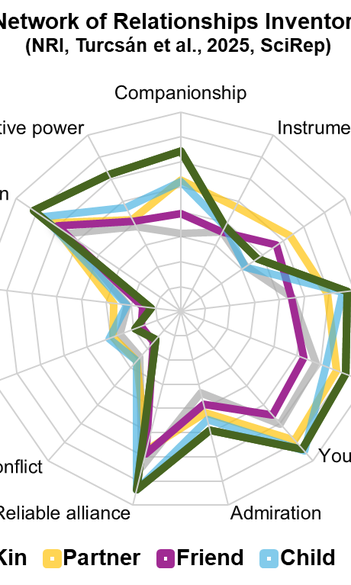Blends of child and best friend, with power imbalance: how dogs fit into our social networks

Our relationship with dogs has evolved dramatically since domestication. Once primarily working animals, dogs have become cherished companions, often considered ‘substitute children’ in many Western societies. Despite this shift, little is known about the specific social roles dogs fulfill in our network of relationships.
Human social networks consist of different partners who offer varying forms of support. For example, romantic partners provide intimacy and aid, children offer opportunities for nurturing and relationship security, while best friends are sources of low-conflict companionship. The study, recently published in Scientific Reports, examined how dogs compare to these human relationships.
Over 700 dog owners rated 13 relationship characteristics regarding their dogs and four human partners: their child, romantic partner, closest relative, and best friend. Results showed that owners rated their bond with their dog as the most satisfying and their dog as their best source of companionship. Owners also felt that their dog loved them the most among all partners. Moreover, similar to children, dogs scored high in nurturing and relationship security and, like best friends, had low levels of antagonism and conflict with their owners. However, there is also a greater power imbalance toward the owner in the relationship with dogs than with any human partner. “Unlike in human relationships, dog owners maintain full control over their dogs as they make most of the decisions, contributing to the high satisfaction owners report. Compared to humans, the relationship with dogs involves few conflicts and minimal negative interactions. The power asymmetry, having control over a living being, is a fundamental aspect of dog ownership for many” - explains senior author Enikő Kubinyi, Head of the Dept. of Ethology at the ELTE and head of MTA-ELTE “Momentum” Companion Animal Research Group. “The results highlight that dogs occupy a unique place in our social world—offering the emotional closeness of a child, the ease of a best friend, and the predictability of a relationship shaped by human control—revealing why our bonds with them are often so deeply fulfilling.”

The study also examined how dog and human relationship ratings relate to one another and found that strong human relationships correlated with stronger bonds with dogs.
“We expected that people with weak human relationships would rely more on their dogs for support, but our results contradict this,” says co-author Dorottya Ujfalussy. “In our sample, people did not seem to use dogs to compensate for the insufficient support in their human relationships.”
However, the researchers note that their sample consisted of volunteers who were likely more satisfied with their relationships than the average dog owner. The study may therefore not fully capture the experiences of vulnerable individuals who rely more heavily on their dogs for emotional support.
“Dogs offer different kinds of emotional and social support depending on the needs of their owners,” - explains Borbála Turcsán, first author of the study. “Some people seek companionship and fun, others need trust and stability, and some simply enjoy having someone to care for.”
Instead of placing the dog-owner relationship into the predefined categories traditionally used in such studies—like ‘family member’ or ‘pet’—the researchers introduced a new, multidimensional approach that better captures its complexity. This framework not only helps us understand how dogs fit into our social lives, but may also reveal where people turn to dogs to fill emotional gaps, and why, for many, the bond runs so deep.
The authors are currently running a new study to deepen the understanding of the dog-human relationship. Dog owners across the world are invited to answer the following questionnaire: https://tally.so/r/nPXKPb
Funding: This study was supported by the Hungarian Academy of Sciences via a grant to the MTA-ELTE 'Lendület/Momentum' Companion Animal Research Group (grant no. PH1404/21), the National Brain Programme 3.0 (NAP2022-I-3/2022). The publication of the press release was supported by the NKFIH Mecenatúra Programme.
Original study: Turcsán, B., Ujfalussy, D. J., Kerepesi, A., Miklósi, Á., Kubinyi, E. "Similarities and differences between dog-human and human-human relationships"
Scientific Reports, DOI: 10.1038/s41598-025-95515-8 https://www.nature.com/articles/s41598-025-95515-8

